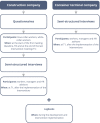The process evaluation of a citizen science approach to design and implement workplace health promotion programs
- PMID: 36002884
- PMCID: PMC9399973
- DOI: 10.1186/s12889-022-14009-8
The process evaluation of a citizen science approach to design and implement workplace health promotion programs
Abstract
Background: Many workplace health promotion programs (WHPPs) do not reach blue-collar workers. To enhance the fit and reach, a Citizen Science (CS) approach was applied to co-create and implement WHPPs. This study aims to evaluate i) the process of this CS approach and ii) the resulting WHPPs.
Methods: The study was performed in two companies: a construction company and a container terminal company. Data were collected by questionnaires, interviews and logbooks. Using the framework of Nielsen and Randall, process measures were categorized in the intervention, context and mental models. Interviews were transcribed and thematically coded using MaxQDA software.
Results: The involvement in the CS approach and co-creating the WHPPs was positively experienced. Information provision, sustained engagement over time and alignment with the workplace's culture resulted in barriers in the CS process. As to the resulting WHPPs, involvement and interaction during the intervention sessions were particularly experienced in small groups. The reach was affected by the unfavorable planning off the WHPPs and external events of re-originations and the covid-19 pandemic.
Discussion: Continuous information provision and engagement over time, better alignment with the workplace's culture and favorable planning are considered to be important factors for facilitating involvement, reach and satisfaction of the workers in a Citizen science approach to design and implement a WHPP. Further studies continuously monitoring the process of WHPPs using the CS approach could be helpful to anticipate on external factors and increase the adaptability.
Conclusions: Workers were satisfied with the involvement in WHPPs. Organizational and social cultural factors were barriers for the CS approach and its reach. Involvement and interaction in WHPPs were particularly experienced in small grouped sessions. Consequently, contextual and personal factors need be considered in the design and implementation of WHPPs with CS approach among blue-collar workers.
Keywords: Blue-collar workers; Citizen science; Process evaluation; Workplace health promotion program.
© 2022. The Author(s).
Conflict of interest statement
The authors declare that they have no competing interests.
Figures
Similar articles
-
Changes in Fruit and Vegetable Consumption and Leisure Time Physical Exercise after a Citizen Science-Based Worksite Health Promotion Program for Blue-Collar Workers.Int J Environ Res Public Health. 2022 Oct 21;19(20):13652. doi: 10.3390/ijerph192013652. Int J Environ Res Public Health. 2022. PMID: 36294231 Free PMC article.
-
Adapting Citizen Science to Improve Health in an Occupational Setting: Preliminary Results of a Qualitative Study.Int J Environ Res Public Health. 2020 Jul 8;17(14):4917. doi: 10.3390/ijerph17144917. Int J Environ Res Public Health. 2020. PMID: 32650415 Free PMC article.
-
Factors associated with blue-collar workers' participation in Worksite Health Promotion Programs: a scoping literature review.Health Promot Int. 2023 Jun 1;38(3):daad052. doi: 10.1093/heapro/daad052. Health Promot Int. 2023. PMID: 37379570 Free PMC article.
-
Barriers and facilitators for participation in workplace health promotion programs: results from peer-to-peer interviews among employees.Int Arch Occup Environ Health. 2023 Apr;96(3):389-400. doi: 10.1007/s00420-022-01930-z. Epub 2022 Oct 28. Int Arch Occup Environ Health. 2023. PMID: 36305914 Free PMC article.
-
Are workplace health promotion programmes effective for all socioeconomic groups? A systematic review.Occup Environ Med. 2020 Sep;77(9):589-596. doi: 10.1136/oemed-2019-106311. Epub 2020 Mar 26. Occup Environ Med. 2020. PMID: 32217755 Free PMC article.
Cited by
-
The implementation of an integrated workplace health promotion program in Dutch organizations - A mixed methods process evaluation.PLoS One. 2024 Nov 1;19(11):e0308856. doi: 10.1371/journal.pone.0308856. eCollection 2024. PLoS One. 2024. PMID: 39485753 Free PMC article.
-
Navigating process evaluation in co-creation: a Health CASCADE scoping review of used frameworks and assessed components.BMJ Glob Health. 2024 Jul 4;9(7):e014483. doi: 10.1136/bmjgh-2023-014483. BMJ Glob Health. 2024. PMID: 38964878 Free PMC article.
-
Citizen Science Studies in Nursing: A Systematic Review.Nurs Rep. 2024 Apr 16;14(2):946-960. doi: 10.3390/nursrep14020072. Nurs Rep. 2024. PMID: 38651484 Free PMC article. Review.
-
Responsive evaluation: an innovative evaluation methodology for workplace health promotion interventions.BMJ Open. 2022 Dec 22;12(12):e062320. doi: 10.1136/bmjopen-2022-062320. BMJ Open. 2022. PMID: 36549731 Free PMC article. Review.
-
Facilitators and Barriers to Implementing Interventions to Prevent Musculoskeletal Disorders in Blue-Collar Workers: A Scoping Review.J Occup Rehabil. 2024 Sep;34(3):555-567. doi: 10.1007/s10926-023-10162-y. Epub 2024 Jan 13. J Occup Rehabil. 2024. PMID: 38218906 Free PMC article.
References
-
- Schreuder K, Roelen C, Koopmans P, Groothoff J. Job demands and health complaints in white and blue collar workers. Work. 2008;31:425–432. - PubMed
-
- Heikkilä K, Fransson EI, Nyberg ST, Zins M, Westerlund H, Westerholm P, Virtanen M, Vahtera J, Suominen S, Steptoe A. Job strain and health-related lifestyle: findings from an individual-participant meta-analysis of 118 000 working adults. Am J Public Health. 2013;103:2090–2097. doi: 10.2105/AJPH.2012.301090. - DOI - PMC - PubMed
-
- Andersen LL, Fallentin N, Thorsen SV, Holtermann A. Physical workload and risk of long-term sickness absence in the general working population and among blue-collar workers: prospective cohort study with register follow-up. Occup Environ Med. 2016;73:246–253. doi: 10.1136/oemed-2015-103314. - DOI - PubMed
Publication types
MeSH terms
LinkOut - more resources
Full Text Sources
Medical
Research Materials


